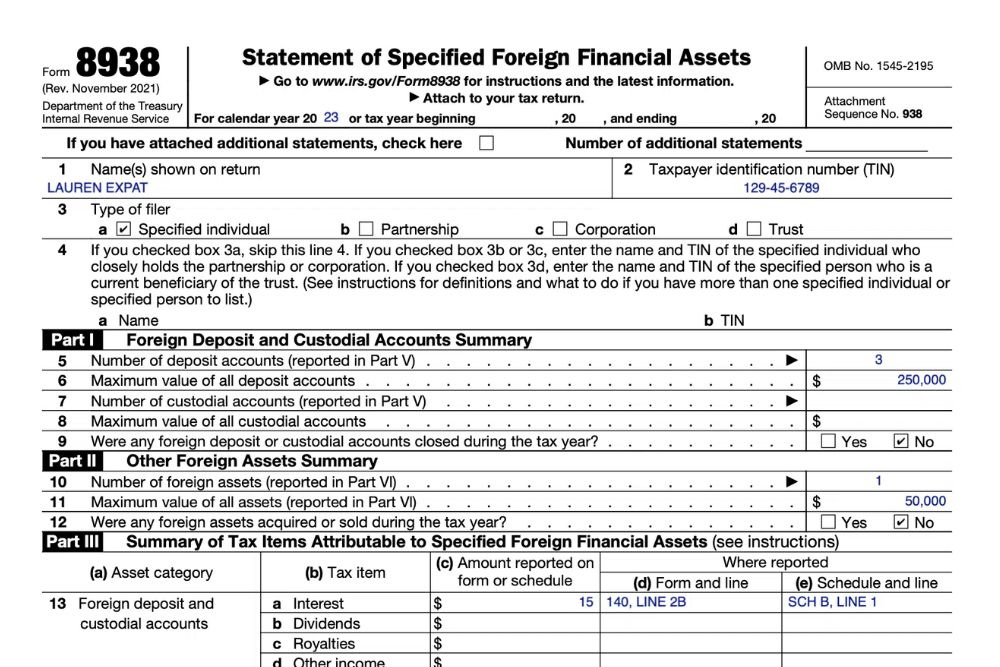FBAR vs. Form 8938: Differences Explained (2025)

As an American living abroad, you may need to file Form 8938 (FATCA report) or a FinCEN Form 114 (FBAR report). But which form should you file? Getting it wrong could result in severe penalties. And while the two forms are similar, they do have some noteworthy differences.
Here’s what you need to know about filing an FBAR or Form 8938.
Key Takeaways
- Form 8938 is similar to the FBAR, and many expats assume that they’re the same thing. However, they are different forms—and understanding the differences is important.
- Form 8938 is used to report foreign financial assets valued above certain thresholds.
- FBARs are used to report a foreign financial account (or accounts) that contains $10,000 at any point during the year. The name may be a bit misleading as more than just foreign bank accounts may require reporting. Other types of financial accounts may also be required to be reported, such as investment accounts, pension and retirement accounts, and certain insurance policies that have a cash surrender value.
What Is an FBAR?
Americans who had at least $10,000 in one or more foreign bank accounts at any time during the year must file FinCEN Form 114 to and report all of their non-US financial accounts This is better known as a Foreign Bank Account Report, or FBAR.
The FBAR was designed to combat tax evasion by making it harder for US citizens to hide their money in offshore accounts. If the IRS contacts you about your failure to file an FBAR, you could face severe penalties, including fines of up to $12,500 per violation. If your failure to file was intentional, you may also face criminal charges and higher fines.
The good news is that the FBAR is purely an informational tax form. That means you’re only filing it to inform the IRS about your foreign financial accounts. You aren’t paying any additional taxes.
What Is Form 8938?
Form 8938 is an informational form used to report foreign assets. Those assets include:
- Bank accounts
- Brokerage accounts
- Stock or securities of foreign issuers and other similar securities
- Foreign financial instruments
- Foreign-issued life insurance
- Annuity contracts with cash value
- Shares in foreign hedge funds and private equity funds
Taxpayers are required to report these assets on Form 8938 if they exceed certain thresholds. These thresholds are based on your residency and filing status. Those thresholds are:
| Filing Status + Residency | Must file if they own… |
| Single taxpayers living in the US: | $50,000 in specified foreign financial assets on the last day of the tax year or $75,000 at any point during the year. |
| Married taxpayers living in the US: | $100,000 in specified foreign financial assets on the last day of the tax year or $150,000 at any point during the year. |
| Single taxpayers living abroad: | $200,000 in specified foreign financial assets on the last day of the tax year or $300,000 at any point during the year. |
| Married taxpayers living abroad: | $400,000 in specified foreign financial assets on the last day of the tax year or $600,000 at any point during the year. |
Like the FBAR, Form 8938 is designed to help the US government stop tax evasion. This reporting requirement is governed by FATCA or the Financial Account Tax Compliance Act, and Form 8938 is often referred to as a FATCA report. Just like the FBAR, it is also an informational report that does not cause any additional taxes to be due.

Are You Ready to Move Abroad?
Choose the answer to each question that best describes you or your current situation, and learn how ready you are to start a life abroad.
Are You Ready to Move Abroad?
"*" indicates required fields

You have an adventurous spirit but you may need to prepare a bit more to ensure a smooth transition abroad. Consider researching more about the cultural, legal, and financial aspects of living overseas.
You’re on the right track. You’ve started to think about what life abroad will entail. Keep building on your preparations to avoid any surprises once you’ve moved.
You’re ready to move abroad! You seem well-prepared and have done your homework! You’re ready to embrace the expat life with confidence.
Key Differences Between FBAR and Form 8938
FBARs and Form 8938 are similar, but there are some key differences. To help you understand whether you are required to file these forms, we’ve put together a table comparing them below.
| Details | Form 8938 | FBAR |
| Who must file? | Specified individuals (US citizens, resident aliens, and certain nonresident aliens) and domestic entities that have an interest in specified foreign financial assets and meet the reporting threshold. | US persons (US citizens, resident aliens, trusts, and estates) that have an interest in foreign financial accounts and meet the reporting threshold. |
| Reporting threshold | Reporting thresholds vary by residency and filing status. (See above for more.) | The aggregate value of all foreign financial accounts exceeds $10,000. |
| What is reported? | The maximum value of the specified foreign financial asset. | The maximum value of the foreign financial account. |
| When is the form due? | The form is due with your federal tax return, including extensions. | The form is due April 15, with an automatic extension to October 15 available. |
| How is it filed? | With your federal income tax return. | Filed electronically through FinCEN’s BSA E-Filing System. |
| Penalties | Up to $10,000 for failure to disclose and an additional $10,000 for every 30-day period of non-filing up to a potential maximum penalty of $60,000. Criminal penalties may also apply. | Up to $12,500 per violation for non-willful failure to file. If your failure to file is considered willful, the fine can be $100,000 or 50% of the balance of the account at the time of the violation, whichever is greater. Criminal penalties may also apply. |
How to Determine Which Forms You Need to File
Determining which forms to file can be complex. Here’s a simplified checklist:
- Review account types: Identify if you have financial accounts or other financial assets abroad.
- Check balances: Determine if your account balances exceed $10,000. If so, you will need to file an FBAR.
- Check your foreign financial assets: Review the value of the relevant foreign financial assets you own (including bank accounts!). If they exceed the threshold for your residency and filing status, you will need to file Form 8938.
- Seek professional advice: Determining your filing obligations for Form 8938 and the FBAR can be complicated. Consult a tax professional like Greenback Expat Tax Services to ensure compliance and avoid penalties.
If you failed to file an FBAR or Form 8938 when required, don’t panic. You can get caught up without the usual penalties by using The Streamlined Compliance Procedures, a tax amnesty program provided by the IRS.
Examples of Form 8938 vs. FBAR
Example #1: Dual Citizen with a Foreign Bank Account
Maria, a single dual citizen of the US and Spain, lives and works in Madrid. She has a Spanish bank account, which at one point during the year had a balance of approximately $14,000. Additionally, she has a small investment account in Spain holding stocks worth approximately $6,000.
- FBAR: Maria needs to file an FBAR because her total foreign financial accounts exceed $10,000 during the year. She must report both her bank and investment accounts.
- Form 8938: If Maria’s total foreign financial assets exceed $200,000 at the end of the year (or $300,000 at any time during the year) and she is a single filer living abroad, she would need to file Form 8938. In this case, since her assets are below the threshold, she does not need to file Form 8938.
Example #2: US Expat with Investments Abroad
John, a single US citizen living in Singapore, holds various financial assets, including:
- A bank account in Singapore with $15,000
- Investments in foreign stocks valued at $150,000
- A foreign mutual fund worth $90,000
- FBAR: John must file an FBAR because his foreign bank account exceeds $10,000.
- Form 8938: John’s total foreign financial assets exceed the $200,000 threshold for single filers abroad. He needs to file Form 8938, reporting all the assets, including the bank account, stocks, and mutual funds.
Example #3: Business Owner with Foreign Business Interests
David, a US resident, has a bank account in the UK related to this business and owns shares in a foreign corporation. The bank account had a maximum balance of $8,000 during the year, and the shares are valued at $50,000.
- FBAR: David is not required to file FBAR for the bank account alone since it does not exceed $10,000. Since his shares are not held in a financial account, but held in paper certificate format, the shares do not need to be reported on an FBAR.
- Form 8938: David’s shares in the foreign corporation and the bank account are considered specified foreign financial assets. If their total value exceeds the applicable threshold ($50,000 at the end of the year for single filers residing in the US), he must file Form 8938, disclosing both the shares and the bank account.
Need Help Filing an FBAR of Form 8938? We’re Here to Help!
We hope this guide has helped you understand the differences between FBAR vs. Form 8938. If you have any questions, we’d be happy to answer them.
If you’re ready to be matched with a Greenback accountant, click the get started button below. For general questions on expat taxes or working with Greenback, contact our Customer Champions.



